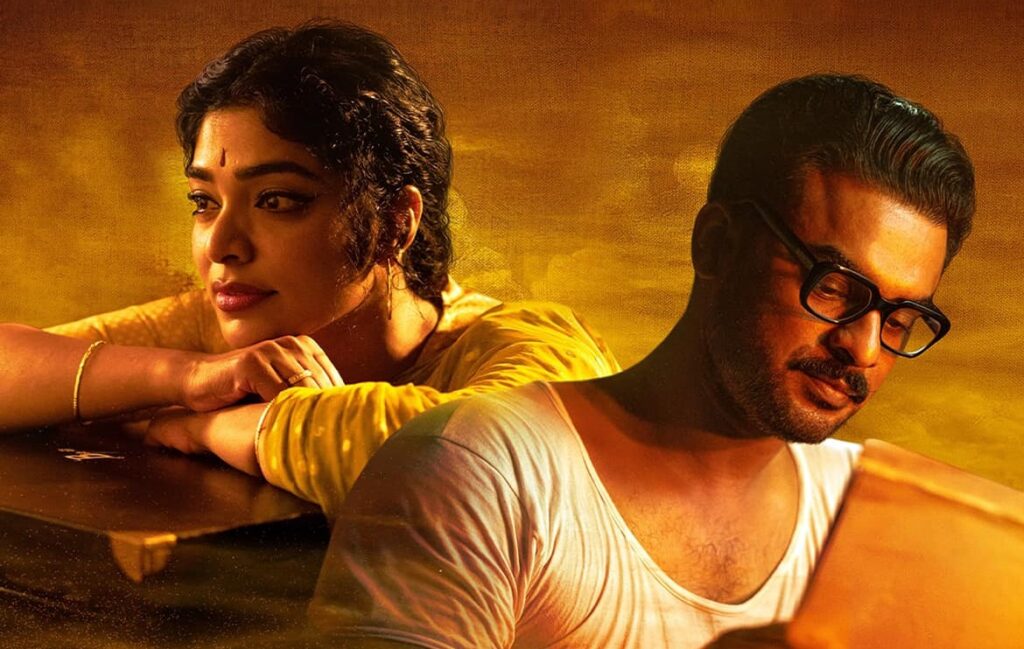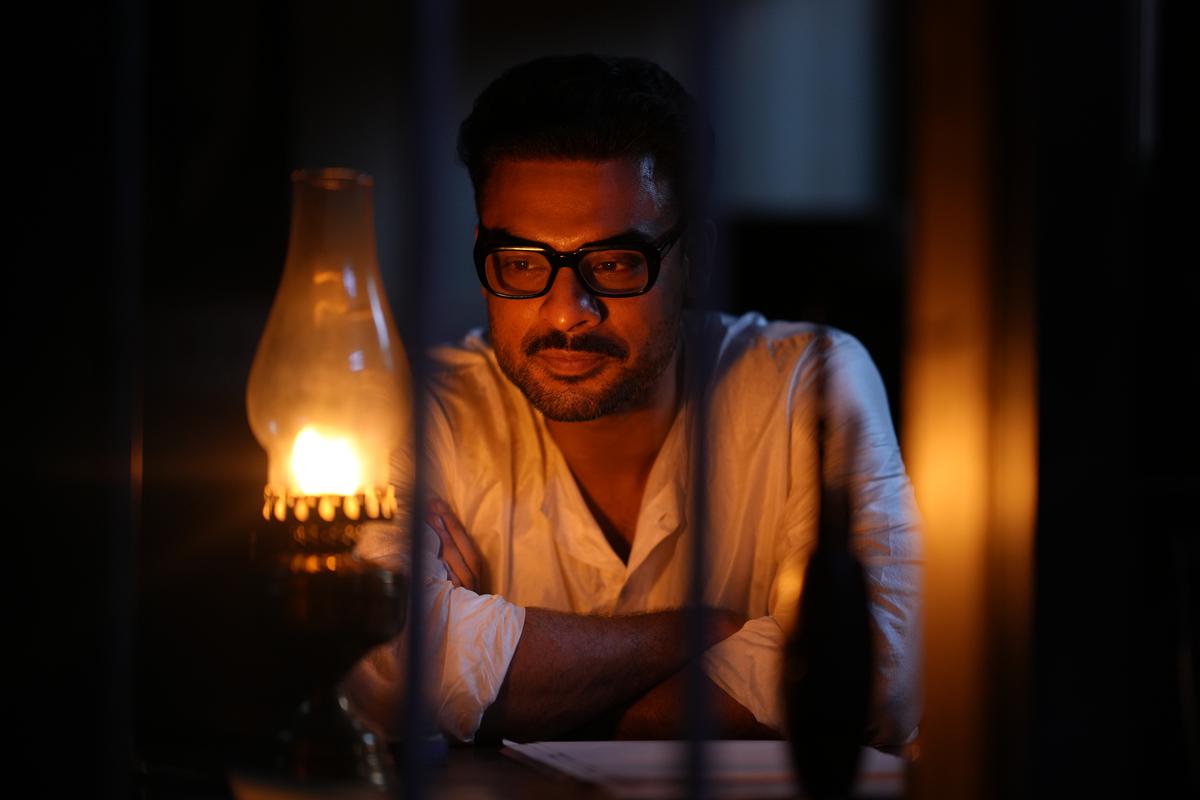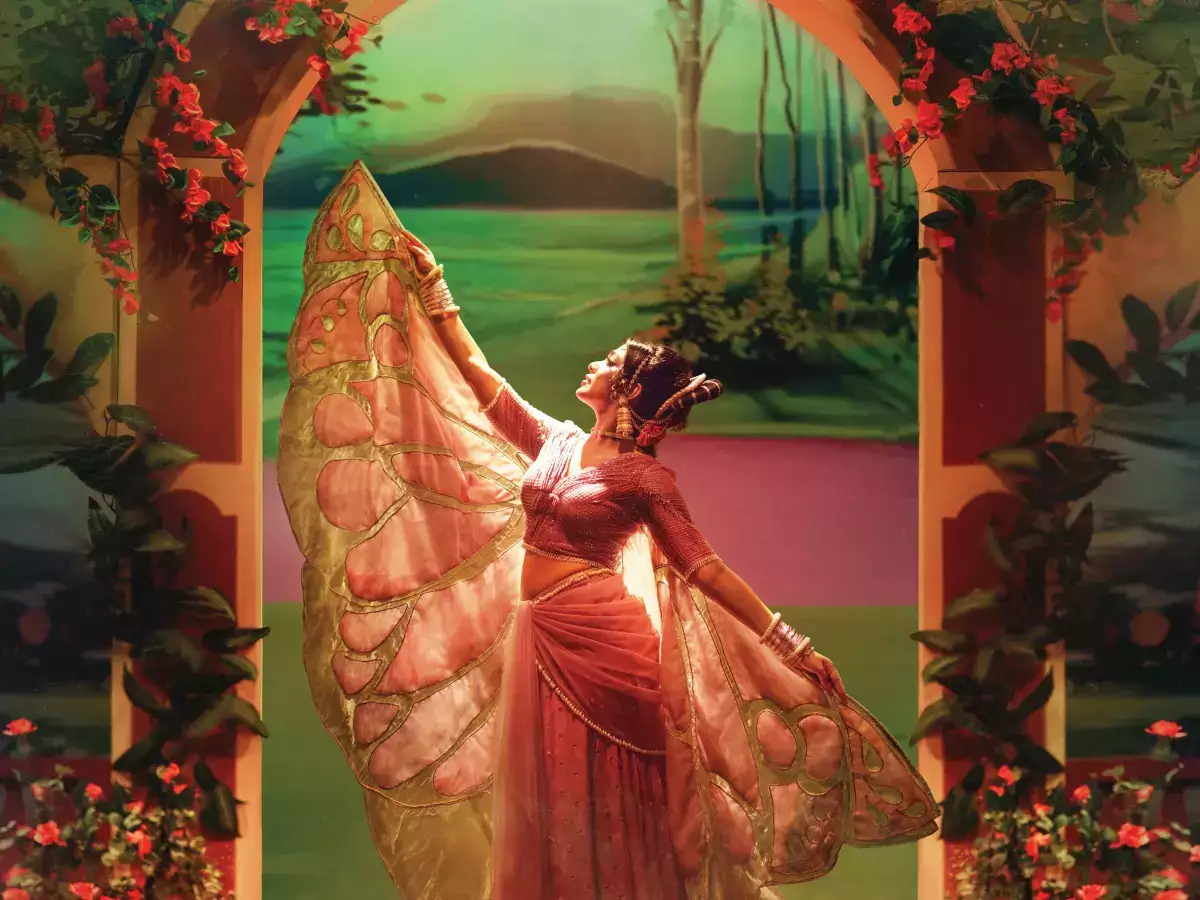
A film rarely becomes so intrinsic a part of a state’s popular culture that its elements alter the way of life of its people forever. Vincent’s 1964 film Bhargavi Nilayam did that to Kerala. 59 years after its release, dilapidated houses in the state touch the pinnacle of obscurity the moment it gets called a ‘bharvagi nilayam’ – a dubious abandoned bungalow that might be home to a ghost or two. Young parents may think twice before naming their daughter Bhargavi, a name so characteristic of a famous ghost. The lovelorn, white-saree-clad woman with a celestial voice is one who would scare the daylights off unassuming males who pass by her spooky abode. Director Aashiq Abu dares to reprise the iconic film (along with a bunch of gorgeously recreated songs) in Neelavelicham (‘Blue Radiance’) – an adaptation of author Vaikom Muhammad Basheer’s autobiographical short story by the same name.
Set in the ’60s, the film kicks off with an unnamed author (Tovino Thomas) landing up in Kerala’s sleepy beach town Thalassery to pen his latest work. Having placed all his money on a bungalow that later turns out to be the haunted ‘Bhargavi Nilayam’, the man is an object of disbelief to the countrymen. The protagonist who does not write off the supernatural presence in the house chooses tenderness to befriend the spirit – his ‘Bhargavi Kutty’.
Aashiq Abu uses a good chunk of the first hour to establish the atmosphere. The map of the bungalow and the adjoining area get imprinted in our minds long before the story takes off. While the novelist accepts the ‘magical shore of solitude’ he is engulfed by, Bhargavi (Rima Kallingal) enters his life with rays of blue radiance. The woman sings a mystic ode to heartbreak (‘Pottithakarnna Kinavu’) to mark her presence with an aesthetic, eerie abandon. Starting this moment, the writer’s life is never the same. Bhargavi, a feared ghost, becomes his guardian angel.

The woman’s story of vengeance would resonate with generations – whether you are familiar with the source material or not. There’s the dalliance of a young couple through love letters, dance performances, clandestine meets by the beach, lonely pathways, and the library. Bhargavi forges a divine union with her sensitive, artsy neighbour Sasi Kumar (Roshan Mathew). When we see the college-going young woman in the flashback portions, she is dressed constantly in various shades of red. She is seen collecting red hibiscus flowers besides receiving a red rose from her lover. The connection between Bhargavi and her all-white-clad beloved is instant. So much so that in no time Bhargavi begins to adorn white – a colour symbolizing their love – unadulterated by lust. Years later, she finds solace in the author who loved his whites as much as the stories he pens.
The villain in the tale is Bhargavi’s maternal cousin Nanukuttan who desires to marry her. Forever dressed in brown and grey shades, the man is the epitome of greed and deceit. It’s a one-note, unexciting character made duller by a famously typecast Shine Tom Chacko. Nanukuttan does not work in Neelavelicham, and at his expense, we fail to invest fully in Bhargavi and Sasikumar’s pining as much as we ought to. During Nanukuttan’s eventual face-off with the protagonist, we feel more for the author’s safety than Bhargavi’s vengeance. It does not help that the character is designed with a generic callous air minus a definitive hunger to unite with Bhargavi at any cost.
ALSO READ: ‘Virus’ review – A masterful survival thriller that celebrates everyday heroes
Aashiq Abu improves on a familiar story by making Neelavelicham a magnificent aural and visual treat. If the use of VFX (notably when the blue luminance appears) is benchmark-setting for the genre in Malayalam cinema, the world-class sound design instantly transports you to the mystic ways of the era. The impact Neelavelicham generates when K S Chithra’s voice reverberates in Dolby Atmos-equipped halls is among the film’s major plusses. The songs begin to appear only towards the end of the second act and continue until the pre-climax. The original score laces them onto the narrative through the clever foreshadowing of their appearance by integrating light background strains minutes in advance. This way, the river-like flow between ‘Ekanthathayude’, ‘Pottithakarnna’, ‘Anuraga Madhuchashakam’, ‘Thamasamenthe’ and ‘Vasantha Panchami’ renders the film an unusual musical spectacle.
Coming to the cultural tidbits in Neelavelicham, it does not do much to modernize the lingo for modern times. The flowery language used to communicate rests well in the narrative as it seems to have emerged straight from wordsmith Basheer’s pen. Moreover, the film is based on a period when a writer’s vocation was legitimate and well-respected. The film does not pay heed to how the Instagram generation may take to it – which is a gamble the makers knew they were taking. If you ask me, I never wished Neelavelicham to tamper with the source material keeping a specific target audience in mind. Aashiq Abu, on his part, does reduce the theatricality contained in the 1964 film whereas DOP Girish Gandhadharan masterfully utilizes the surroundings. Filmed in a rather intimate setup, Bhargavi Nilayam and the dubious well inside which Bhargavi resides have been created with stupendous detailing. The production designer ensures that we understand the anatomy of the house and the courtyard before immersing in what is Bhargavi’s road to revenge.

Neelavelicham gives Aashiq Abu ample scope to leave a directorial stamp and he manages it to a decent extent. Some of the recurring frames – notably one by the beach and an aerial shot of a confluence near Bhargavi Nilayam – are fascinating. The intelligent use of colours and slow-motion add dollops of spook into the story without making it an out-and-out horror fare. The jump scares, although far and few between, are fabulously timed. The supporting characters exist, not only to create suspense and suspicion but also to supplement the author’s journey into a realm of revelations. We precisely know where the film is headed when the protagonist plays Pankaj Mullick’s ‘Guzar Gaya Woh Zamana Kaisa’ as he engages in daily chores.
While comparisons to the first edition are inevitable, the filmmaker interprets the characters differently. If Neelavelicham’s Bhargavi is never intended to be as ethereal as Bhargavi Nilayam’s beauteous spirit, the author in the new version is a lot more contemplative. The duo never converse face-to-face but the filmmaker employs mirrors and a photograph of Bhargavi to construct the intimacy between them. The villain, as stated before, is too basic to evoke hatred in us. It has much to do with wrong casting and our excessive exposure to similar straight-lined characters in cinema. That said, Aashiq Abu’s film, despite its uneven pacing, tides beautifully between the various acts and is aided effectively by excellent music (Bijibal, Rex Vijayan). Neelavelicham is a hypnotic, well-crafted experience that ought to be relished in a quality cinema hall – sparing the makers of comparisons to Vincent’s 1964 classic.
Rating: ★★★ 1/2

